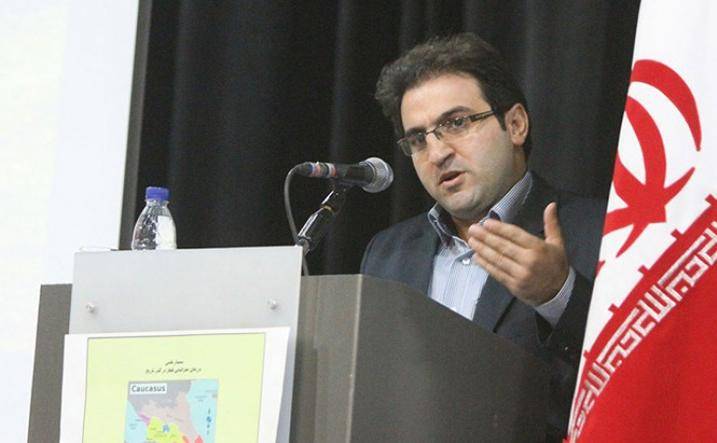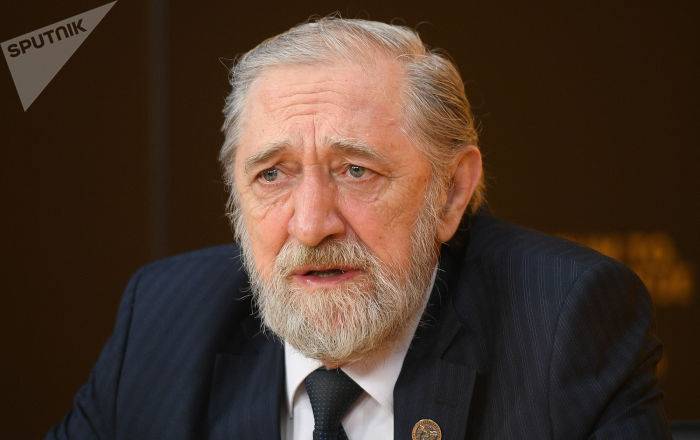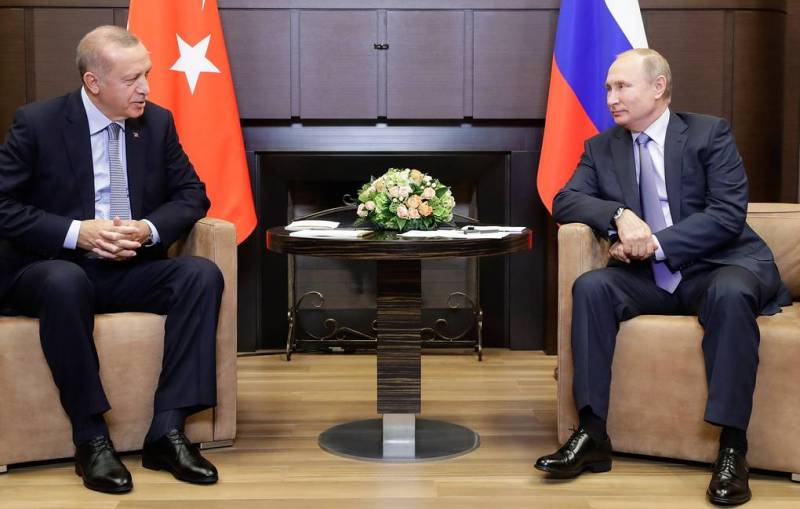Now - 11:02:21
Russia: Eurasia aziopa Il?

Discussion to bypass the realities
Last week, Moscow hosted the international conference "Central Asia and Russia". It is noteworthy primarily to the fact that there once again unsuccessfully sought the answer to the question posed in the title. Russia — Eurasia on Gumilev or aziopa, like Milyukov? The forum was attended by experts not only from the countries of the region, along with Russian, but also from China and Iran. It is also noteworthy that the forum had ignored diplomats and experts from Turkey.

And this despite the fact that most of the Russian and especially the Central Asian analysts actually encouraged Turkey to take an even more active policy in the region. In Asia, many openly welcomed the integration processes, which stimulates Ankara within the framework she created in 2009, the Turkic Council. In the above-mentioned Council includes five countries: in addition to Turkey, Kazakhstan, Kyrgyzstan, Azerbaijan and Uzbekistan. His next intergovernmental conference took place in Tashkent in early October.
Perhaps the most substantive at the Moscow forum was a speech by Iranian analysts: Wali Katihar Kaleji (Iranian Council for Eurasian studies) and Alireza Bigdeli (Institute of political studies of the Iranian foreign Ministry). They stressed that Iran is also intensifying cooperation with the countries of the region and with Russia for economic reasons and in order to prevent involvement of the Central Asian countries in the anti-Iranian US policy.
From Tehran constantly hear complaints about the fact that without significant political and economic influence in the region increases. Therefore, the Americans may force these countries to indirect or even direct involvement in anti-Iranian policy of Washington.
While the pace of the Iranian-Central Asian trade has been growing in recent years at full speed, but this trade, as noted by Iranian intelligence, still far from the record levels of trade in the Central Asian region with China and Turkey. That is not connected at least with the psychological impact of anti-Iranian U.S. policy on Central Asian countries.

These ratings were, shall we say, no "substantive" comments from other forum members. But in a brief conversation with the author, participated in this conference, Mr. Kalaji noted that, in the opinion of the Iranian side, Turkey pursued a policy of "Pro-Turkish" integration in the region with the consent of the United States. Who do not want to "Shine" as a kind of first violin in rallying Central Asian countries to curb the growing influence of China and the potentially strong influence of Iran.
Anything controversial
By the Way, is not the first year with no practical advance is the project of oil and gas pipelines from Iran through Central Asia to China, developed in the mid-90s. And Kazakhstan with Azerbaijan, recall declined in the same period from the transit of oil for export through the ports "antiamericanismo" of Iran. As you know, they chose the transit (late 90's) under the influence of USA and Turkey via pipelines through Turkey and Turkish ports.
As you know, the Turkish and especially the Western energy business in the first half of 90-ies took a decisive position in Caspian oil consortia in Kazakhstan and Azerbaijan. As for the tone of the whole forum, almost all his other wordy other participants called for enhanced partnership of countries in the region not so much with Russia, but with Turkey and especially China.
Among the main supporting examples of "multi-vector" of the benefits of such a course was given with effect from 2010-2014, three high-power gas pipeline from Turkmenistan, Uzbekistan and Kazakhstan to China with a total capacity of 25 billion cubic meters per year. In addition, as is well known, soon to be built fourth pipeline in the same direction. They are all built or under construction more than 70% of Chinese loans and equity loans.
But, again, on the forum, not a word was said about the fact that these supplies are at least 60% of the total cost for Beijing, at the expense of growing in front of PRC debt of Tashkent, Nur-Sultan and especially of Ashgabat. And in addition, at low gas export prices. And in this situation it is not excluded, according to some Chinese, Turkish and American media that China in the medium term will be to reduce gas imports from Russia by pipeline "Power of Siberia" (more than 5 thousand km).
And in parallel will be introduced by the end of November an annual capacity of at least 30 billion cubic meters. Moreover, the price of Russian gas supplies to China on 25-30% less in comparison with export prices for Central Asian gas to China.
For this reason brightly expressed Zhang Ning, Director of the regional Department of the Chinese research Institute of Russia, Central Asia and Eastern Europe. He in his speech said that the total debt of the Central Asian countries to China is estimated at more than $ 30 billion., moreover, "precise data on the debt of Turkmenistan to China is not, but here is a rough estimate — nearly $ 12 billion". The Chinese side, "understanding the situation in the countries of the region, does not intend to accelerate payment of these debts."
This strategy of China, as explained on the forum the head of the Chinese Center for internationalenergy research Shi Jie, "a composite element of long-term vision of China "One belt and one road", especially for more active cooperation with the countries of Central Asia in the very long terms."
This suggests that, probably, China due to the debt deferment and/or new loans plans indefinite binding is relatively cheap Central Asian gas to Chinese needs in this raw material. And the indirect, if not direct, the confirmation of predictions about what's Russian gas exports to China will be a problem, is that, according to available data, not expected until the end of the negotiations, ongoing since 2014, the construction of additional Transantiago gas pipeline to China (20 billion cubic meters per year).
The Heirs of sun Tzu
Chinese Ambassador to Russia Li Hui 29 APR 2015 simple and "transparent" explained the oil and gas Agency RCC (Russian): "negotiations on the Western route of gas supplies from Russia to China through the Altai region. Power "Transalaska" of the highway is specified on the basis of assessed demand in China for pipeline gas and supply capacity from other sources". The same situation with this project today.
But, again, among the main presentations at the forum were allocated to the development of Russian-Turkish partnership in the region. Victor Nadein-Raevsky, Director of the research Institute for black sea-Caspian region at IMEMO, argued that such a partnership directed against U.S. plans to dominate the region that Ankara and the Turkic Council are not interested in "push" Russia, China or Iran from Central Asia etc. As a kind of basic stimulus for these partnerships is its presence in Syria.

Most Russian experts, speaking at the Russian-Turkish subjects expressed a similar view. But the Iranian and Chinese experts chose not to comment on these estimates... However, the current situation in the North of Syria, when Turkey is again trying to master this region coupled with its oil and gas resources and transit oil and gas pipelines, brings, as we know, a lot of issues in Russian-Turkish partnership on the settlement of the situation in the country. And in General, political relations of Moscow and Ankara and in the actual assessment strategy of Ankara, as well, and the United States in Syria.
I would Like to understand who's changed this strategy from the 1930s — 50 years, when the possession Ankara Northern Syria, supported by the US, was the main goal of Turkey's Syrian policy? (See. article ). Unfortunately, Vladimir Nadein-Rayevsky did not explain these aspects.
As for the aforementioned Turkic Council (TC), initiated 10 years ago by Turkey and Kazakhstan in the framework now being developed to 40 the integration of programs aimed at closer political and economic partnership of Turkey with Russia, Iran or China, and Central Asian countries, Azerbaijan and Hungary.
Not too late 2021, there will come Hungary (yet — a country-observer in the vehicle) — a NATO member, like Turkey. But not only: it is characterized by the statement of the head of Turkey R. Erdogan in Baku on 15 October: "the Next summit will be held in Turkey (in 2020. — Approx. ed.). We will be glad to see it Turkmenistan, and all six States of one nation (i.e. Turkic. — Approx. ed.) all of them will be together."
In short, the conference did not give substantive answers to pressing questions about trends in the relations of Russia with the countries of Central Asia and of the growing outside influence on these trends. And could, if most of the experts were really objective and not reflect a desirable them the political situation in the relationship...
Related News
Russia in Syria beat all? The consequences of the meeting of Putin and Erdogan
At the border of Syria and Turkey comes out of the Russian military police, and Turkey announced the completion of a recent military operation "the Source of peace". The decision Recep Tayyip Erdogan took in the landmark meeting w...
What do we do "Sarmatians" and su-57? Machines may turn off!
the Let it storm?Likely, this event did not seem very important. Think was remotely shut off some compressors to provide the work of enterprises of Gazprom! Experts have explained: the compressors were not on the main gas pipeline...
The Nazis and their accomplices. Belgorod oblast
Alas, as regrettable as it may sound, but we continue. Yes, , we made some conclusions with which you will introduce in the next article.in the meantime, reading the comments some of our readers, we will say one thing: we have to ...
















Comments (0)
This article has no comment, be the first!